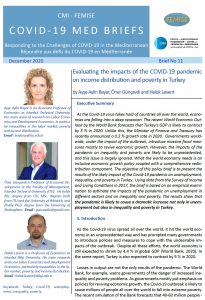The recent coronavirus crisis threatens the health, economies and societies of all countries. In Southern and Eastern Mediterranean countries, the fight against the pandemic is even more complicated. Cooperation and EU-Med strategies in key sectors are needed. Therefore, the Center for Mediterranean Integration (CMI) and FEMISE join forces and launch their joint series of Policy Briefs called “COVID-19 MED BRIEFS” to pave the way for thematic analyses and policy relevant recommendations.
The eleventh COVID-19 MED BRIEF, entitled “Evaluating the impacts of the COVID-19 pandemic on income distribution and poverty in Turkey” by Ayşe Aylin Bayar, Öner Günçavdı and Haluk Levent is available here
 Summary:
Summary:
As the Covid-19 virus takes hold of countries all over the world, economies are falling into a deep recession. The recent World Economic Outlook by the World Bank forecasts that Turkey’s GDP is likely to contract by 5 % in 2020. Unlike this, the Minister of Finance and Treasury has recently announced a 0.3 % growth rate in 2020. Governments worldwide, under the impact of the outbreak, introduce massive fiscal measures mostly to revive economic growth. However, the impacts of the pandemic on inequality and poverty are likely to be unprecedented, and this issue is largely ignored. What the world economy needs is an inclusive economic growth policy coupled with a comprehensive redistribution component.
The objective of this policy brief is to present the results of the likely impact of the Covid-19 pandemic on unemployment, inequality, and poverty in Turkey. Using data from the Survey of Income and Living Conditions in 2017, the brief is based on an empirical examination to estimate the impacts of the pandemic on unemployment in different sectors and on inequality and poverty. The results show that the pandemic is likely to cause a dramatic increase not only in unemployment but also in inequality and poverty in Turkey.
This Policy Brief is produced as part of the series of Policy Briefs on « Responding to the Challenges of COVID-19 in the Mediterranean » that is undertaken in partnership between FEMISE and the Center for Mediterranean Integration (CMI).
The views expressed in this Brief are those of the authors and do not reflect the views of CMI or FEMISE. The contents have not been subjected to verification by CMI or FEMISE and their publication does not reflect ownership by CMI or FEMISE.


